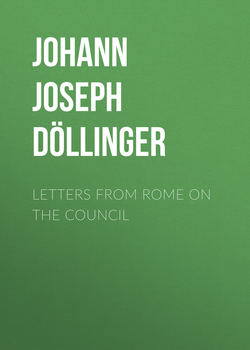Читать книгу Letters From Rome on the Council - Johann Joseph Ignaz von Döllinger - Страница 6
The Fulda Pastoral. (Allg. Zeit., Sept. 25, 1869.)
ОглавлениеThe Pastoral which the Bishops assembled at Fulda ordered to be read in all the Churches under their jurisdiction is an important document. It reflects the excited and abnormal state of feeling prevalent among Catholics, since the Jesuits, and some Prelates allied with them, have announced the design of using the Council for proclaiming new dogmas, especially that of Papal Infallibility. “Even among loyal and zealous members of the Church,” say the Bishops, “anxieties calculated to weaken confidence are being excited.” The object and main substance of their Pastoral is directed to allaying those anxieties, and assuring German Catholics that their Bishops at least will not assent to the projected dogmas. They have solemnly pledged their word, before the whole nation, that they will avouch at the Council the three following principles —first, “That the Council can establish no new dogmas, or any others than are written by faith and conscience on all your (German Catholics') hearts;” secondly, “That a General Council never will or can proclaim a new doctrine not contained in Holy Scripture or Apostolic Tradition;” thirdly, That only “the old and original truth will be set in clearer light.”
This indeed is very re-assuring. The Jesuits have proclaimed that the bodily Assumption of the Holy Virgin and the Infallibility of the Pope are to be made dogmas at the Council. The Bishops are aware that the two Jesuit organs, the Civiltà, and Rheinischen Stimmen, from the Monastery of Laach, as well as the Archbishop of Mechlin (Deschamps), and Bishop Plantier of Nîmes, have put forward the erection of Papal Infallibility into a dogma of the Universal Church. Moreover, the assembly at Fulda knew well enough that the preliminary materials for this definition were already prepared at Rome. Now nobody will seriously maintain that these two opinions are written by faith and conscience on the heart of every Catholic, or are doctrines contained in Scripture and Tradition, and ancient and original truths. The Pastoral therefore contains a promise, worded with all the distinctness that could be desired, that, so far as it depends on the votes of the German Bishops, the yoke of the new articles of faith shall not be laid on the German nation.
The German Bishops cannot of course pledge themselves beforehand for the whole Council, for they will have at most only about 25 votes at their disposal – a small number in an assembly of 400 or 500 bishops. But if these 25 votes, which represent nearly eighteen million Catholics, and the whole of a great nation, remain united and firm, they are a guarantee that the new dogmas will not be decreed. For it is not majorities or minorities that decide on dogmas, but the Church requires the actual or approximate unanimity of the whole assembly. And it may be assumed as probable that the Austrian Bishops will not separate themselves from their German colleagues in these weighty questions, except, of course, the Bishop of St. Pölten, who already openly declares himself for the principal new dogma, and will therefore no doubt vote for it. It may, moreover, be confidently asserted that a considerable portion of the French Bishops will unite with the German Opposition against the new dogmas. And an Opposition so numerous and so compact will make it impossible for the Latin Prelates to carry through their pet doctrines, powerful as they may appear, if their votes are counted and not weighed.
From another point of view, too, the Pastoral is noteworthy and gratifying. It markedly discountenances that pessimism which for some thirty years past has characterized Papal documents, and which gave occasion to the observation that Pius ix. and his predecessor whine whenever they talk Latin. Occurrences in Italy, Spain, and Germany, and the history of the Austrian Concordat, with many other things, have led most of the clerical organs to take a gloomy view of the state of the world; and we frequently find them maintaining that a universal overthrow of the whole order of society in the Christian world, a universal deluge, is inevitable, but that the ship of the Church, the one asylum of safety, will float, like the ark, upon the waves, and then will begin a new order of things, and new period of history corresponding to the ultramontane ideal. In sharp antithesis to these gloomy pictures and predictions, the Bishops declare, first, that throughout the world the kingdom of God increases with fresh vigour, and brings forth fruit; secondly, that all attacks on the Church, and sufferings brought upon her, work for her good; and thirdly, that religious and ecclesiastical life is strengthened. Such a view as this is better calculated to arouse and sustain attachment to the Church and confidence in her indestructible powers of life and providential guidance than the opposite view, which exhibits to Catholics everywhere nothing but the humiliation of their Church and the triumph of her enemies.
